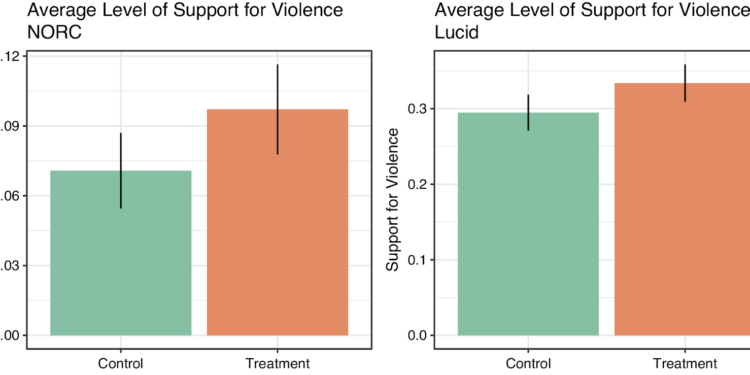Studies 1 (NORC) and 2 (Lucid) Comparison: NORC study conducted Feb 19-21, 2023; Lucid study conducted Apr 20-23, 2022. This sample shows higher baseline support for violence, possibly due to Lucid respondents’ more extreme political views (see Westwood et al., 2022a; Westwood et al., 2022b; Bright Line Watch n.d.). Despite differing baseline support, similar treatment effects were observed across samples, reinforcing the causal link between anti-Black threat perception and support for violence. Img source: www.cambridge.org
April 10, 2024 Story by: Publisher
A recent study conducted by a research team at George Washington University, led by Assistant Professor of Political Science Andrew Thompson, sheds light on the correlation between anti-Black sentiment and widespread support for political violence in the United States.
Drawing on historical contexts dating back to slavery, the researchers aimed to understand contemporary attitudes towards racial diversification in the country. Through a series of national surveys, participants were asked to share their thoughts on the changing demographics of the United States.
The results revealed a concerning trend: a significant portion of the American public perceives Black Americans as a threat more than any other racial group. This perception, the study found, significantly contributes to increased support for political violence across various studies conducted by the team.
Published in Perspectives in Politics, the paper titled “Anti-Black Political Violence and the Historical Legacy of the Great Replacement Conspiracy” emphasizes how perceptions of Black Americans’ political and economic influence persist despite evidence to the contrary. These misconceptions not only fuel democratic regression but also contribute to the endorsement of political violence.
Assistant Professor Thompson highlighted the importance of addressing these attitudes, stating, “Events like the Buffalo shooting in 2022 are not flashes in the pan, but instead connect deeply to how many others are thinking.” The study underscores the need for increased safeguards and attention to protect Black Americans from the ramifications of such perceptions.
Furthermore, the study revealed that discussions about the diversification of white Americans often disproportionately associate it with Black Americans, leading to heightened anti-Black sentiment. Across the surveys, Black Americans were referenced 51% of the time, compared to 33% for Latinx and Hispanic Americans, and 15% for Asian Americans.
The findings underscore the intricate relationship between racial perceptions and attitudes towards violence in shaping public opinion, highlighting the need for deeper examination and proactive measures to address these issues. Source: PHYS

















